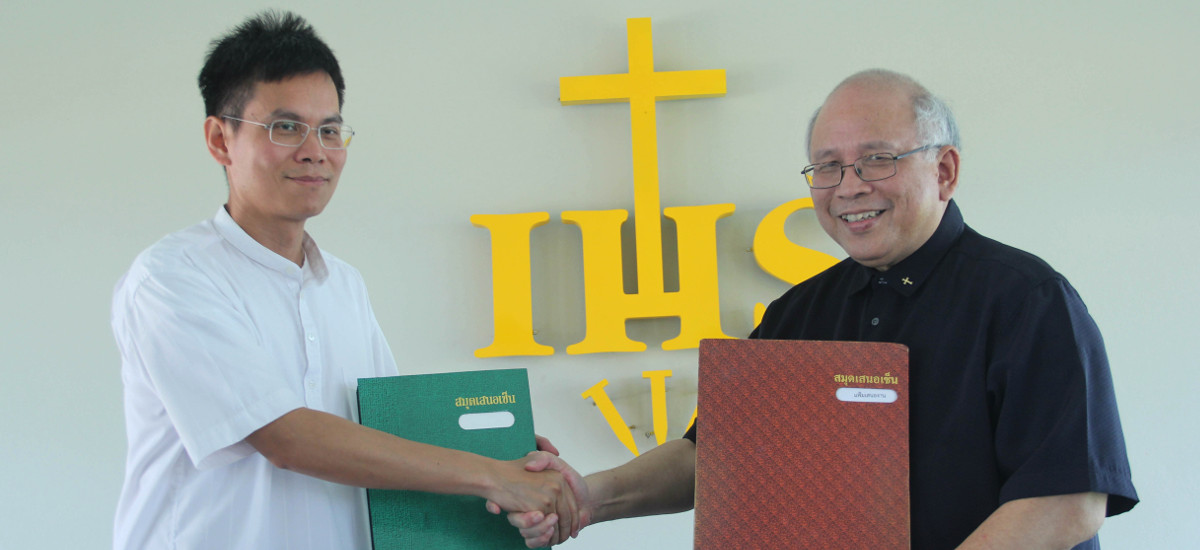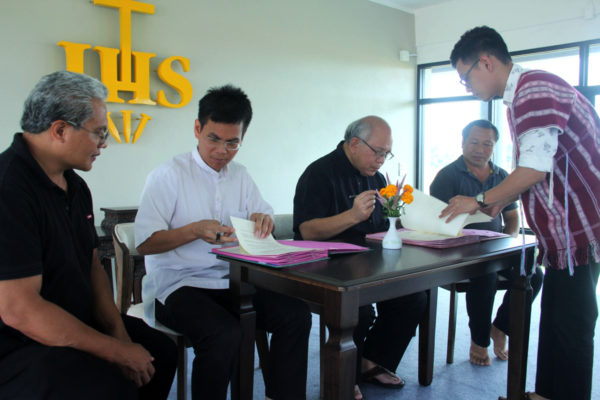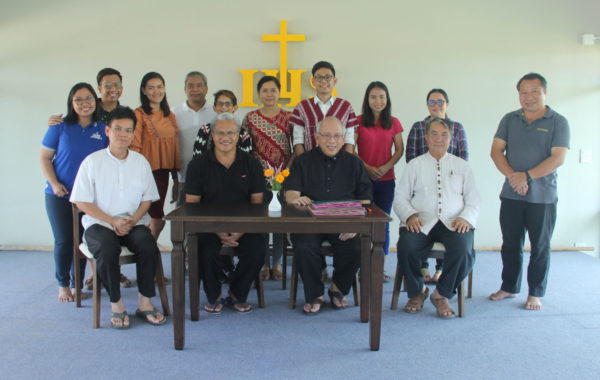 Xavier Learning Community (XLC), an education project of the Jesuit Foundation for Education in Thailand, and Ateneo de Davao University (AdDU) in the Philippines have signed an agreement to work together to develop XLC into a college.
Xavier Learning Community (XLC), an education project of the Jesuit Foundation for Education in Thailand, and Ateneo de Davao University (AdDU) in the Philippines have signed an agreement to work together to develop XLC into a college.
 On August 20, 2018, AdDU President Fr Joel Tabora SJ and XLC Director Fr Pichet Saengthien SJ signed the memorandum of agreement at the XLC campus in northern Thailand, in the presence of two witnesses, Thailand Jesuit Regional Superior Fr Agustinus Sugiyo Pitoyo SJ and Jesuit Conference of Asia Pacific President Fr Antonio Moreno SJ.
On August 20, 2018, AdDU President Fr Joel Tabora SJ and XLC Director Fr Pichet Saengthien SJ signed the memorandum of agreement at the XLC campus in northern Thailand, in the presence of two witnesses, Thailand Jesuit Regional Superior Fr Agustinus Sugiyo Pitoyo SJ and Jesuit Conference of Asia Pacific President Fr Antonio Moreno SJ.
The agreement comes after nine months of consultation and dialogue that began with an exploratory meeting in November 2017. Representatives of XLC, which had begun operations only three months earlier, travelled to the Philippines to meet with the AdDU team and introduce the fledging institution’s context, vision and mission.
Collaboration was deemed feasible due to the common vision and goal of creating culturally diverse learning institutions that uplift and empower young people from ethnic communities, or indigenous peoples. Also, as Jesuit schools, they share the aim of forming competent and humane leaders able to respond to needs and challenges, and to work for and with others to build a just and harmonious world.
In March, the AdDU team led by Fr Tabora went to Thailand to get a better understanding of XLC. They met the students, discussed their life at XLC and in their ethnic communities, visited their home villages and learnt of their aspirations. The AdDU delegation also learnt about the social issues affecting indigenous peoples and the government requirements for operating a higher education institution from Dr Yos Santasombat of Chiang Mai University’s Department of Sociology and Anthropology, and Dr Warayuth Siwarakuel, Assumption University’s Vice President for Research and Academic Services.
 According to the terms of the agreement, AdDU will help XLC develop a roadmap towards becoming a quality higher education institution serving ethnic minorities in northern Thailand. To this end, the institutions will work together on ethnographic research to understand the culture of XLC students, and the challenges and issues in their communities.
According to the terms of the agreement, AdDU will help XLC develop a roadmap towards becoming a quality higher education institution serving ethnic minorities in northern Thailand. To this end, the institutions will work together on ethnographic research to understand the culture of XLC students, and the challenges and issues in their communities.
The research will take a participatory approach with XLC students, teachers, community leaders and other stakeholders. This approach will enable the students to understand more of their roots, traditions and indigenous wisdom, and hence become more aware of their culture. The students will also share their findings and experiences with students from other ethnic groups, which will help them recognise and appreciate each other’s culture.
The institutions will also work to build up XLC’s curriculum. XLC will improve its study programmes by combining indigenous knowledge and wisdom with that from the wider world. AdDU will assist XLC in implementing its existing curriculum by deploying faculty for supervision, mentoring and monitoring, and assigning volunteer teachers from its Cardoner volunteer programme.
Finally, the partnership aims to develop in XLC an Ignatian formation programme through a lived experience of the joy of Christianity. This will be done with the assistance of experts in Ignatian formation, provided by AdDU.
The agreement is already bearing fruit. Three Cardoner volunteers are teaching several core subjects at XLC. Anthropologists from AdDU and XLC are working with Chiang Mai University and a local priest to review existing research, and discuss how they can cooperate in furthering their knowledge and developing a culture-appropriate curriculum.
“With this partnership, we hope that AdDU and XLC can work together to form students to become leaders, sui generis, towards reconciliation with God, other people – humanities and culture – and nature,” said Fr Tabora.

